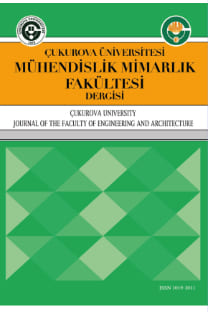Şelit Cevherinin Fiziksel ve Manyetik Alınganlık Özelliklerinden Yararlanılarak Zenginleştirilmesine Yönelik Deneysel Çalışma
Tungsten metali yüksek erime sıcaklığı (3.410 oC) ve yoğunluğu (19,3 g/cm3) nedeniyle birçok endüstriyel uygulamada kullanılmaktadır. Aydınlatma lambalarının filamenti, tungsten metalinin günlük hayatta kullanımına en güzel örnek olarak gösterilmektedir. Ancak, doğada bulunan tungsten cevherlerinin WO3 tenörü %0,30-%1,50 arasında değişmekte ve zenginleştirme işlemleri ile cevherin içerdiği WO3 tenörünün yükseltilmesi gereklidir. Bu sebeple Uludağ/Bursa bölgesinden alınan şelit cevherinin fiziksel ve manyetik alınganlık özelliklerinden yararlanılarak zenginleştirilmesi araştırılmıştır. Gemini masası ile cevherin WO3 tenörü %84,37 verimle %0,32'den %5,01'e yükseltilmiştir. Manyetik ayırma testleri ile birlikte WO3 tenörü %95 verimle %41,37 olmuştur. Son aşamada, kavurma işleminin ardından manyetik ayırma testleri tekrarlanmış, nihai konsantrenin WO tenörü %49,94 ve zenginleştirme prosesinin verimi %83,51 olarak hesaplanmıştır
Experimental Study on Beneficiation of Scheelite Ore through its Physical and Magnetic Susceptibility Properties
Tungsten metal is used in many industrial applications due to its high melting temperature (3,410 oC) and density (19.3 g/cm3). The filament of lamps can be shown as the best example for the daily use of tungsten metal. WO3 content of tungsten ores however varies from 0.30% to 1.50% in nature. It is necessary that the WO3 content of the ore must be increased through beneficiation methods. For this purpose, beneficiation of scheelite ore collected from Uludag/Bursa was investigated depending on its physical and magnetic susceptibility properties. The WO3 content of scheelite ore increased to 5.01% from 0.32% with 84.37% recovery using a Gemini shaking table. Thereafter, that value was upgraded to 41.37% with 95% recovery after the magnetic separation. In the last stage, roasting followed by magnetic separation tests were performed and the WO3 content of final concentrate was 49.94% and the recovery of the process conducted in this paper was calculated as 83.51%
___
- 1. Srivastava, J.P., Pathak, P.N., 2000. Preconcentration: A Necessary Step for Upgrading Tungsten ore, Int. J. Miner. Process., vol. 60, pp. 1–8.
- 2. Dongfang, L., Yuhua, W., Tao, J., Wei S., HU, Y., 2016. Study on Pre-concentratıon Effıciency of Wolframite from Tungsten ore Using Gravity and Magnetic Separations, Physicochem. Probl. Miner. Process., vol. 52, p. 719−729.
- 3. Blackburn, W. H., Denner, W. H., 1988. Principles of Mineralogy, 413 pp. 1 st edition, W.C. Browns Publishers, Dubuque, Iowa, USA.
- 4. Srinivas, K., Sreenivas, T., Natarajan, R.,. Padmanabhan N.P.H., 2000. Studies on the Recovery of Tungsten from a Composite Wolframite–scheelite Concentrate, Hydrometallurgy, vol. 58, pp. 43-50.
- 5. Gao, Y., Gao, Z., Sun, W., Hu, Y., 2016. Selective Flotation of Scheelite from Calcite: A Novel Reagent Scheme. International Journal of Mineral Processing, vol. 154, pp. 10-15.
- 6. Feng, B., Guo, W., Xu, H., Peng, J., Luo, X., Zhu, X., 2017. The Combined Effect of lead Ion and Sodium Silicate in the Flotation Separation of Scheelite from Calcite. Separation Science and Technology, vol. 52(3), pp. 567-573.
- 7. Bhatti, M.A., Kazmi K. R., Mehmood, R., akram, A., 2014. Flotation Study on Scheelite ore of Chitral, Khyber Pakhtoonkhwa, Pakistan. Pakistan Journal of Scientific and Industrial Research. Series A. Physical Sciences, vol. 145 (3), pp. 145-153.
- 8. Hui, S., 2015. Flotation Experiments of a Lowgrade Scheelite. Metal Mine, 1, 015.
- 9. Weiss, N. L., 1985. SME Mineral Processing Hand book, vol. 2, Section 27, 18 pp, Society of Mining Engineers (SME) of AIME, New York, USA.
- 10. Lu, D., Wang, Y., Jiang, T., Sun, W., Hu, Y., 2016. Study on Pre-concentration Efficiency of Wolframite from Tungsten ore using Gravity and Magnetic Separations. Physicochemical Problems of Mineral Processing, vol. 52(2), pp. 718-728.
- 11. Hedayati H. S., Noaparast, M., Tonkaboni, S. Z. S. M., Hosseini, S. M., 2016. Application of Gravity Separators for Enrichment of South Chah-Palang Tungsten Ore. Int. Journal of Mining & Geo-Engineering, vol. 50(1), pp. 1-12.
- 12. Greaves, J. N., 1989. Tungsten and Gold Recovery from Alaskan Scheelite-bearing Ores. Report of Investigations 9251, Bureau of Mines and United States Department of the Interior.
- 13. Wills, B. A., 1992. Mineral Processing Technology, 464 pp. 5 th Edition, Pergamon Press, New York, USA.
- 14.Cui, Z., Liu, Q., Etsell, T. H. 2002. Magnetic Properties of Ilmenite, Hematite and Oilsand Minerals After Roasting. Minerals Engineering, vol. 15(12), pp. 1121-1129.
- 15. Hrouda, F., 2003. Indices for Numerical Characterization of the Alteration Processes of Magnetic Minerals Taking Place During Investigation of Temperature Variation of Magnetic Susceptibility. Studia Geophysica et Geodaetica, vol. 47(4), pp. 847-861.
- 16. Merritt, R. R., Cranswick, L. M. D., 1994. The Origin of Magnetic Susceptibility in Roasted Ilmenite. In 6 th AusIMM Extractive Metallurgy Conference. Melbourne: The Australian Institute of Mining and Metallurgy (pp. 171-180).
- 18. Kazmi, K. R., Bhatti, M.A., Bhatti, A., Mehmood, A., Anwar, M.S., Sheikh, S.T., 2012. Beneficiation Studies on Low-grade Tungsten Ore of Chitral, Khyber Pukhtunkhwa, Pakistan, Pakistan Journal of Scientific and Industrial Research, vol. 55, pp.8-13.
- 18. Guar, R.P. S., 2006. Modern Hydrometallurgical Production Methods for Tungsten, Journal of the Minerals, Metals and Materials Society, vol 58, pp. 45 – 49.
- 19.Razavizadeh, H., Langroudi, A.E., 2006. Production of Tungsten Via Leaching of Scheelite With Sulfuric Acid, Minerals and Metallurgical Processing, vol. 23, pp.67-72.
- 20. Zhao, Z., Li H., Liu, M., Sun, P., Li Y., 1996. Soda Decomposition of Low-grade Tungsten ore Through Mechanical Activation, Journal of Central South University of Technology, vol. 3 pp. 181-184.
- ISSN: 1019-1011
- Yayın Aralığı: Yılda 4 Sayı
- Başlangıç: 1986
- Yayıncı: ÇUKUROVA ÜNİVERSİTESİ MÜHENDİSLİK FAKÜLTESİ
Sayıdaki Diğer Makaleler
Yumuşak Çeliğin Korozyon Davranışı
MUSTAFA KEMAL KÜLEKCİ, UĞUR EŞME, ABDUL KADİR EKŞİ, Zülfü KOÇOĞLU, NECİP FAZIL YILMAZ
Stearik Asit Çeşidinin Kalsit Kaplama Verimi Üzerine Etkisi
NECDET GEREN, ÇAĞRI UZAY, METE HAN BOZTEPE, MELİH BAYRAMOĞLU
Experimental and Numerical Studies on Tensile and Shear Fracturing of Brittle Materials
Yeraltı Maden Ocaklarında Aydınlatma Koşullarının Belirlenmesi
Endüstriyel Tesisler için Güneş Duvarı Performansının İncelenmesi
Katı Molibden Bileşiklerinin Elektrokimyasal İndirgenmesiyle Molibden Üretimi
Metehan ERDOĞAN, Bengisu AKPINAR, İshak KARAKAYA
Yapıların Dinamik Analizinde Kullanılan Sönüm Modellerinin İncelenmesi
